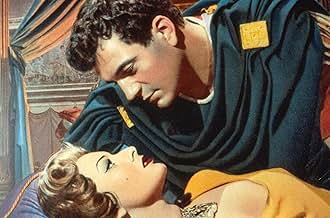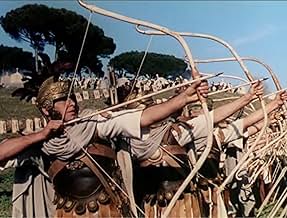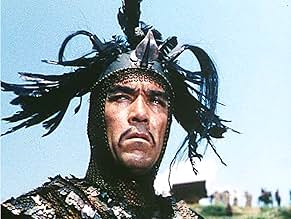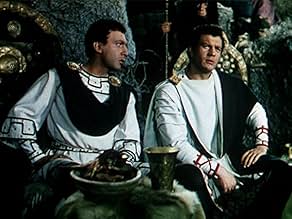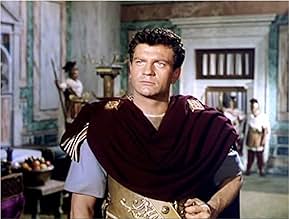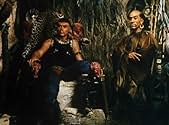Attila
- 1954
- Tous publics
- 1h 20m
IMDb RATING
5.4/10
823
YOUR RATING
Attila, the leader of the barbarian Huns and called by the Romans "The Scourge of God", sweeps onto the Italian peninsula, defeating all of the armies of Rome, until he and his men reach the... Read allAttila, the leader of the barbarian Huns and called by the Romans "The Scourge of God", sweeps onto the Italian peninsula, defeating all of the armies of Rome, until he and his men reach the gates of the city itself.Attila, the leader of the barbarian Huns and called by the Romans "The Scourge of God", sweeps onto the Italian peninsula, defeating all of the armies of Rome, until he and his men reach the gates of the city itself.
Anthony Quinn
- Attila
- (as Anthony Qvinn)
Eduardo Ciannelli
- Onegesius - Counselor to Attila
- (as Eduardo Cianelli)
Featured reviews
Although not without its unintentionally funny moments, compared to most of the Sword and Sandal films that were churned out by Hollywood on the Tiber, this one is not at all bad.
Anthony Quinn's testosterone filled, Alpha male performance here certainly fits historian Edward Gibbon's description of Attila as 'a formidable barbarian' whilst the oestrogen of pneumatic Sophia Loren as Honoria practically leaps off the screen. Honoria was a tragic character who had the misfortune to be born the daughter of an emperor and to be treated miserably by her domineering mother but her one-dimensional portrayal here is par for the course in films of this type.
The year this film was released was notable for both Quinn and La Loren as he also appeared in a little opus entitled 'La Strada' and she was directed for the first time by Vittorio de Sica in the 'Pizza con credito' segment of 'L'Oro di Napoli' in which he brought out the Neapolitan earthiness and innate comedic ability that were to serve her so well through the years, not least in the amusing 'Peccato che sia una canaglia' from the same year which marked the first of her many films with a certain Marcello Mastroianni.
A good supporting cast, all of whom are adequately 'dubbed' comprises Colette Régis as the wilful Galla Placidia and Henri Vidal as Aetius. The emperor Valentinian III, described by Gibbon as 'feeble and dissolute', is convincingly played by Claude Laydu who will forever be associated with the title character of Bresson's 'Journal d'un curé de compagne'. Mention must be made of the wondrous Irene Papas in the minor role of one of Attila's many wives. She was to go from strength to strength, especially in classical Greek tragedy and utilised what one critic has called her 'elemental nobility' as the widow opposite Quinn's Zorba. For those interested in such things, neither Honoria nor Aetius met their ends in the manner depicted here.
Designed to warm the hearts of the Faithful, the final scene, complete with heavenly chorus and a crucifix in the sky, shows Attila being persuaded by Pope Leo not to attack Rome. It is not known what was said or indeed what inducements were offered but it is doubtful whether a heathen such as Attila would have been swayed by Leo's eloquence and sacerdotal robes alone and it is more likely that he turned back because of plague in his army, lack of food and the threat of Roman reinforcements from the East.
Oh well, as the man said, 'it's only a movie.'
Anthony Quinn's testosterone filled, Alpha male performance here certainly fits historian Edward Gibbon's description of Attila as 'a formidable barbarian' whilst the oestrogen of pneumatic Sophia Loren as Honoria practically leaps off the screen. Honoria was a tragic character who had the misfortune to be born the daughter of an emperor and to be treated miserably by her domineering mother but her one-dimensional portrayal here is par for the course in films of this type.
The year this film was released was notable for both Quinn and La Loren as he also appeared in a little opus entitled 'La Strada' and she was directed for the first time by Vittorio de Sica in the 'Pizza con credito' segment of 'L'Oro di Napoli' in which he brought out the Neapolitan earthiness and innate comedic ability that were to serve her so well through the years, not least in the amusing 'Peccato che sia una canaglia' from the same year which marked the first of her many films with a certain Marcello Mastroianni.
A good supporting cast, all of whom are adequately 'dubbed' comprises Colette Régis as the wilful Galla Placidia and Henri Vidal as Aetius. The emperor Valentinian III, described by Gibbon as 'feeble and dissolute', is convincingly played by Claude Laydu who will forever be associated with the title character of Bresson's 'Journal d'un curé de compagne'. Mention must be made of the wondrous Irene Papas in the minor role of one of Attila's many wives. She was to go from strength to strength, especially in classical Greek tragedy and utilised what one critic has called her 'elemental nobility' as the widow opposite Quinn's Zorba. For those interested in such things, neither Honoria nor Aetius met their ends in the manner depicted here.
Designed to warm the hearts of the Faithful, the final scene, complete with heavenly chorus and a crucifix in the sky, shows Attila being persuaded by Pope Leo not to attack Rome. It is not known what was said or indeed what inducements were offered but it is doubtful whether a heathen such as Attila would have been swayed by Leo's eloquence and sacerdotal robes alone and it is more likely that he turned back because of plague in his army, lack of food and the threat of Roman reinforcements from the East.
Oh well, as the man said, 'it's only a movie.'
Knowing of director Francisci’s subsequent contribution to the peplum genre, I fully expected this to be a low-rent version of SIGN OF THE PAGAN (1954) – which I watched the previous day – but the film ultimately proved fairly interesting in its own right. For one thing, the narrative has at least as many differences as similarities vis-a'-vis the Douglas Sirk epic and, once again, we have an imposing Hollywood star (Anthony Quinn) in the lead. Sophia Loren, then, stands in for Ludmilla Tcherina (though her character is ambitious and deceitful) while Henri Vidal – from the best Italian-made spectacular, FABIOLA (1948) – replaces Jeff Chandler (bafflingly, he dies here while Attila is allowed to live!). Another reversal has the Huns fighting amongst themselves – more specifically, Attila and his peace-craving brother: just as Jack Palance in SIGN OF THE PAGAN was forced to kill his daughter for what he deemed treacherous behavior, so does Quinn in this case with his sibling. In support of them, we have: Claude Laydu (from Robert Bresson’s DIARY OF A COUNTRY PRIEST [1951]), a most surprising choice to play the typically wimpish Emperor; Irene Papas, who takes on the role of Attila’s sole wife (and, conveniently, his astrologer as well); and Eduardo Ciannelli, appearing as a wise old Hun. While Sirk tried – with some measure of success – to put his distinctive mark upon the material, Francisci was content to imitate the Hollywood model (and QUO VADIS [1951] in particular). Consequently, the film features intermittent ponderous narration, gratuitous exotic touches (in the form of a dance sequence and Laydu keeping a pet leopard) and an unlikely – if still effective – spiritual conclusion wherein the Huns are finally driven away thanks to the intervention of Pope Leo and his ‘army’ of cross-wielding supporters. Otherwise, the picture has a handsome look (i.e. bearing soft colors), compelling enough confrontation scenes (within both camps), and a long-in-coming but satisfactory climactic skirmish. The main downside is that the version broadcast on late-night Italian TV is the shorter U.K. cut (running a mere 76 minutes in PAL mode), albeit in its native language, as opposed to the official 100-minute print (which probably explains the references to a couple of minor plot points that are not actually shown)! Incidentally, reading through the credits one recognizes the names of several crew members who would later become directors in their own right: Luciano Ercoli, Christian Marquand, Flavio Mogherini, Luigi Scattini and Primo Zeglio...not to mention some heavyweights in the international film industry like Dino De Laurentiis, Carlo Ponti, Giuseppe Rotunno, Karl Struss and Aldo Tonti!
Destroying towns and cities across the Alp to Italy, the mounted hordes led by Attila, King of the Huns, reached the gates of Rome where they were stopped by the Cross and turned back by Pope Leo I...
Anthony Quinn is Attila, the infamous 5th Century barbarian in this Italian unworthy spectacular...
Sophia Loren offers a pretty presence as the ambitious tempting Honoria who accepts Attila as a husband just to save Rome... She loses her life and half of her kingdom...
Quinn tries his best in his portrayal of the infamous Attila, but the script is bad and unreasonable...
Anthony Quinn is Attila, the infamous 5th Century barbarian in this Italian unworthy spectacular...
Sophia Loren offers a pretty presence as the ambitious tempting Honoria who accepts Attila as a husband just to save Rome... She loses her life and half of her kingdom...
Quinn tries his best in his portrayal of the infamous Attila, but the script is bad and unreasonable...
It's very hard to make a film about Attila and his times because if you want to make it historically accurate, well, that's not a simple thing. There are many Church traditions about Attila and his eventual sparing of Rome but historians of the day were notorious for shaping it to make themselves or their leaders look best. It is what it is...or was. So, it's difficult to say exactly what Attila did....such as the death of his brother...of which are contradictory accounts. This version of his latter days is based mostly on Church traditions.
Like many films of the 1950s and 60s, European filmmakers hired a famous American actor to star in the production. In this case, Anthony Quinn plays Attila the Hun...and he also appeared in a few other European films, such as Fellini's "La Strada". And, Quinn was then dubbed into Italian...as most of the actors in the film are Italians (though it's a French-Italian co-production).
The story is set from the period in which Attila agreed to a substantial bribe by the Romans not to destroy the Empire. Shortly after this, Attila reneged on the agreement and a long strong of bloody battles resulted. This film dramatizes this period and offers a traditional view as to why he spared Rome.
The film is well made and entertaining....it just isn't perfect history because of all the speculation. But this is NOT a reason to skip the film. It's well worth your time and it's also nice to see Sophia Loren in a supporting role early in her film career.
By the way, although the acting was generally good, the character Emperor Valentinian III seemed a bit overacted. Perhaps I'm wrong...he just didn't seem all that realistic.
Like many films of the 1950s and 60s, European filmmakers hired a famous American actor to star in the production. In this case, Anthony Quinn plays Attila the Hun...and he also appeared in a few other European films, such as Fellini's "La Strada". And, Quinn was then dubbed into Italian...as most of the actors in the film are Italians (though it's a French-Italian co-production).
The story is set from the period in which Attila agreed to a substantial bribe by the Romans not to destroy the Empire. Shortly after this, Attila reneged on the agreement and a long strong of bloody battles resulted. This film dramatizes this period and offers a traditional view as to why he spared Rome.
The film is well made and entertaining....it just isn't perfect history because of all the speculation. But this is NOT a reason to skip the film. It's well worth your time and it's also nice to see Sophia Loren in a supporting role early in her film career.
By the way, although the acting was generally good, the character Emperor Valentinian III seemed a bit overacted. Perhaps I'm wrong...he just didn't seem all that realistic.
The script is admittedly very badly written but it follows roughly Attila 's biography.Of course ,as it is a 75 min movie,many moments are passed over in silence but all that concerns the main characters is accurate: the brother was slain by Attila and his German vassals ,Honoria tried to forge an alliance with him,(but her brother locked her into a convent),and yes,the pope found the right words to stop the conqueror.He had previously failed in front of Paris ,reportedly with a little help from Saint Genevieve ,a woman of God who urged the Parisians to resist.
The film suffers from an international ill-assorted cast:an American (Quinn) ideally cast as the bar bar,an Italian (Sophia Loren) which made sense,but also a Greek thespian (Irene Pappas) plus three French actors :Henri Vidal cast as the noble loyal hero- a character not unlike the legionnaire he played in "Fabiola"-,who was formerly Attila's good friend (?),Claude Laydu who gives a passable performance of an effeminate fearful emperor ,probably influenced by Peter Ustinov's masterful portrayal of Nero in Mervyn Le Roy's "Quo Vadis" ,Colette Régis,an obscure actress plays his mother ,an over possessive one of course.
Also handicapped by a last scene which verges on Christian propaganda -the last picture is revealing-,the film is to recommend only for Quinn's fans.
The film suffers from an international ill-assorted cast:an American (Quinn) ideally cast as the bar bar,an Italian (Sophia Loren) which made sense,but also a Greek thespian (Irene Pappas) plus three French actors :Henri Vidal cast as the noble loyal hero- a character not unlike the legionnaire he played in "Fabiola"-,who was formerly Attila's good friend (?),Claude Laydu who gives a passable performance of an effeminate fearful emperor ,probably influenced by Peter Ustinov's masterful portrayal of Nero in Mervyn Le Roy's "Quo Vadis" ,Colette Régis,an obscure actress plays his mother ,an over possessive one of course.
Also handicapped by a last scene which verges on Christian propaganda -the last picture is revealing-,the film is to recommend only for Quinn's fans.
Did you know
- TriviaAnthony Quinn worked on La strada (1954) simultaneously with this movie. He remarked that it had a much smaller budget than the Attila epic, but considered it a much better film.
- Crazy creditsAlthough this was an Italian co-production shot in Italy, Eduardo Ciannelli's name is misspelled in the credit.
- ConnectionsFeatured in Soldiers: Cavalry (1985)
- How long is Attila?Powered by Alexa
Details
Box office
- Budget
- ITL 450,000,000 (estimated)
- Runtime1 hour 20 minutes
- Aspect ratio
- 1.37 : 1
Contribute to this page
Suggest an edit or add missing content


